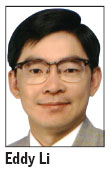What Japanese yen depreciation hints for city's economy?
Updated: 2013-05-17 06:40
By Eddy Li(HK Edition)
|
|||||||||

Since Shinzo Abe became the prime minister of Japan again on Dec 26, 2012, his first priority was to revive the country's moribund economy by adopting multiple economic measures. One of the most effective was to depreciate the Japanese yen, in order to stimulate the economy. This move has been effective, for it has immediately enhanced the export of Japanese goods, resuscitated tourism and the related catering and retail industries.
Some might ask why the measure was not taken earlier by the government now that the stimulation is having such a positive effect on the long-term economic downturn in Japan. Opinions towards this question are divided. Many hold the view that the main reason was pressure from the United States. From my perspective, however, the strengthening of the Japanese yen is attributable to the earthquake in 2011.
The devastating earthquake and tsunami which turned many cities to ruin destroyed Fukushima I Nuclear Power Plant, inflicting heavy losses on Japan's economy. The whole country, at that time, was facing a crucial period of reconstruction, and needed to import large quantities of energy resources and infrastructure materials from all over the world to rebuild the earthquake-stricken areas and support the basic living of victims of the disaster. In the first 11 months in 2012 alone, Japan's import of liquefied natural gas reached 80 million tons, taking up one-third of the total global trading amount in the previous year. That necessitated the Japanese government spending a wealth of their reserve for foreign exchange. Under such a situation, the government had no choice but to keep strengthening the yen to increase its purchasing power and reduce the cost of nationwide reconstruction.
Two years later, as assorted problems have become more stable, the materials for reconstruction are now basically owned by the country, and this is high time for Abe to take official steps to let the yen soften even more, just as the US did to stimulate the economy.
The fluctuation of the yen has somehow affected Hong Kong. Some people hold the view that a softened yen has brought benefits to us, for example, Hong Kong enterprises have spent less to import components or raw materials from Japan, thus saving business costs. But the reality is that due to the long-term strengthening of the yen, most Hong Kong enterprises have chosen the Chinese mainland, South Korea or other countries above Japan. The established stable cooperation is not shaken easily. Thus, the overall influence is not as sizable as we expected.
Others posit that the depreciation is harmful for Hong Kong goods export, as the profit from exports to Japan is lessened. I don't consider this a troubling problem, because after the economic downturn in Japan for so many years, the orders have already dropped significantly, causing the proportion of Hong Kong goods exported to Japan to decrease. The influence on Hong Kong is small.
People who worry about the import and export businesses between Hong Kong and Japan can now relax a little.
Nevertheless, the problem worrying me most is that the yen's depreciation has elevated Japan's competitiveness, which affects the economic pattern of the whole of Asia and Hong Kong significantly. To start with, the softened yen lowers the production cost to Japanese enterprises, which promises greater exporter power of their products. Second, parts of the companies might relocate their overseas production lines back to Japan, indirectly cutting down the GDP in the related countries or areas, and causing unemployment issues. Last but not least, the more valuable foreign currencies become, the more attractive Japan gets as a tourist destination, which could be evidenced by the unprecedented popularity of traveling to Japan in the Lunar New Year and Easter Day holidays.
The author is the vice-president of the Chinese Manufacturers' Association of Hong Kong.
(HK Edition 05/17/2013 page1)